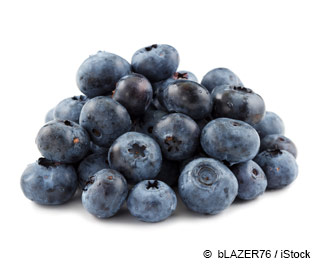The Buzz on Blueberries
Botanical name: Vaccinium corybosum

Not only are blueberries one of the few naturally occurring true blue foods,1 they are also one of the three fruits native to North America.2 There are more blueberry species native to North America than any other continent, with the main species being northern and southern highbush, lowbush, half-high and rabbiteye.3
You can grow blueberries in your own garden. They thrive on acidic soil that's rich in organic matter. Plant them in a spot that receives an ample amount of sunlight to make sure that they grow and fruit well. The plants should start to fully produce fruits by their sixth year. The best way to determine if the fruits are ready for picking is by tasting them. Blueberries that are left unpicked a week after they turned blue tend to be sweeter.4
If you aren't eating blueberries right away, you can freeze them for later use. The best way to do this is to spread them on a baking sheet, unwashed, in a single layer. Put them in the freezer, and once frozen, place them in a freezer bag. This keeps them from clumping together and absorbing unwanted moisture.5
Keep in mind that blueberries may lose some of their nutritional value and flavor when frozen.6 Whether fresh or frozen, the pale, powder-like coating on blueberries called "bloom," should remain until just before eating, as it helps protect the fruit from damage and disease.7
Health Benefits of Blueberries
The use of blueberries as a folk medicine was a precursor to the extracts used today for a number of illnesses.8 Vitamins K and C provide the highest amount of vitamins in blueberries, whereas manganese is the most prominent mineral. The remaining nutrients in blueberries is fairly balanced between vitamin E, thiamin, riboflavin and vitamin B6.9,10
Phytonutrients also account for the health benefits of blueberries. Among these are anthocyanins, which are bioactive flavonoid compounds that give blueberries their vivid color and are also known for their natural ability to help neutralize free radicals.11 Other beneficial compounds in blueberries include pterostilbene,12 procyanidins, chlorogenic acid, quercetin, myricetin and resveratrol, among others.13 These compounds exhibit antioxidant and anti-inflammatory properties.14
The compounds in blueberries may help lower the risk for cancer,15 particularly breast cancer, colon cancer, esophageal cancer and cancer of the small intestine.16,17 Blueberries may also help improve cardiovascular health, raise good cholesterol levels, lower blood pressure,18 improve insulin resistance19 and lower the risk for macular degeneration.20 For more information about the nutritional content of blueberries, check out the nutrition facts table below:21
Blueberries Nutrition Facts
Serving Size: 3.5 ounces (100 grams), raw
| Calories |
57 |
|
| Total Fat |
0.33 g |
|
| Saturated Fat |
0.028 g |
|
| Trans Fat |
|
|
| Cholesterol |
0 mg |
|
| Sodium |
1 mg |
|
| Total Carbohydrates |
14 g |
|
| Dietary Fiber |
2.4 g |
|
| Sugar |
9.96 g |
|
| Protein |
0.74 g |
|
| Calcium 6 mg |
Iron |
0.28 mg |
Studies Done on Blueberries
Some of the most researched benefits of blueberries are their antioxidant and antiaging properties. Several studies have shown that blueberries may help protect against age-related deficits in memory and motor function, possibly due to the fruit's polyphenolic compounds having the ability to help lower oxidative stress, fight inflammation and change neuronal signaling.22,23,24,25,26
In another study published in the journal Phytotherapy Research, anthocyanin extracts of blueberries were evaluated for their cancer-fighting potential. Results show that they may help inhibit cancer cell proliferation by “acting as cell anti-invasive factors and chemoinhibitors.”27
Blueberry Healthy Recipes:
Super Boost Power Smoothie

|
Ingredients:
|
|
✓ 1 cup blueberries
|
✓ 4 cups rice milk or almond milk
|
✓ 1 large banana
|
✓ 2 tablespoons whey protein powder or 4 raw pasture-raised eggs
|
|
✓ 1 tablespoon bee pollen
|
✓ ¼ cup almond butter
|
✓ 1 teaspoon spirulina or other green powder
|
✓ 2 tablespoons flax seeds
|
|
✓ 1 inch fresh ginger
|
✓ 2 teaspoons lemon juice
|
✓ 2 ounces aloe vera juice
|
✓ 2 cups water
|
Procedure:
- Place all ingredients into a blender.
- Mix until smooth then serve immediately.
(From "Healthy Recipes for Your Nutritional Type" by Dr. Mercola)
Blueberry fun facts
Blueberries were significant in the lives of Native Americans, who referred to them as "star berries" because of the five-point star shape of their calyx. They were revered as a gift from the Great Spirit to help feed their children during famine.28 Blueberries were also used in folk medicine to help alleviate diarrhea and mouth or throat inflammation.29
Summary
Whether they're eaten straight from the bush or baked into your favorite recipe, blueberries are among the fruits with the highest antioxidant activity.30 One of their most valuable compounds is anthocyanin, which not only gives them a vivid pigment, but also helps neutralize harmful free radicals that can lead to cancer and other serious diseases.31
Blueberries also contain a wide array of phytonutrients and are rich in immune-boosting vitamin C, bone-healthy vitamin K and heart-healthy fiber. Together, these compounds may help decrease your risk of breast cancer, colon cancer, esophageal cancer and cancers of the small intestine,32,33 as well as promote healthy cholesterol, blood pressure and blood sugar levels.34,35